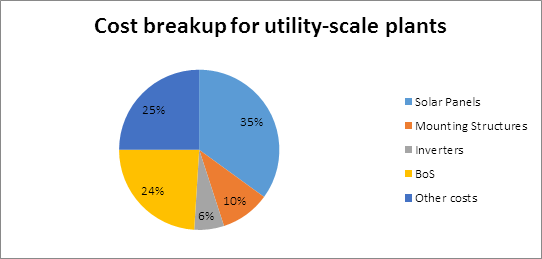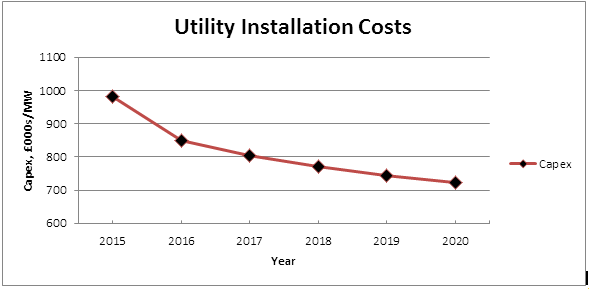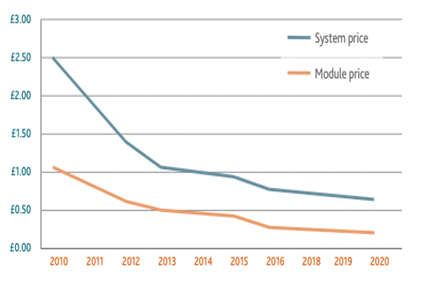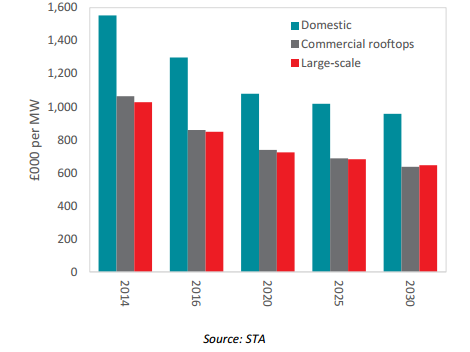What is utility-scale solar?
Utility-scale solar refers to large-scale solar power plants, typically starting with 1 MW. This post discusses the installation cost of utility-scale solar power plant (£/MW) in the UK.
What are the components that contribute to the cost of a utility-scale solar plant?
Utility-scale solar power plant installations comprise the following components:
- Solar panels
- Inverters
- Mounting structures
- Balance of systems
- Installation costs
A pie-chart representing the cost-breakup of different components in the UK is depicted below.
Please note the points below:
- The Balance of System (BoS) comprises of junction boxes, HV, LV and DC electrical works, transformers, switch gears, AC and DC cables, security systems etc.
- The Other costs include costs for installation, all kinds of approvals, land registry & planning, grid integration, engineering and technical analysis, plant validation, financial & legal services, etc.
Is the cost inclusive of incentives?
It is worth noting that no incentives are included as part of the evaluation of the installation cost. In fact, the Renewable Obligation Certificate (ROC), which was available for ground mounted systems above 5 MW, was scrapped in April 2015.
Is land cost a significant portion of total cost?
Typically, solar farms are set up in rural areas where the land is available cheap and is owned by farmers. Generally, solar developers pay the land owner a rent of £1000 per acre per annum. So, assuming 5 acres for a 1 MW plant, the land cost can be taken to be £5000. This amount is very insignificant in comparison to the total project cost. So, as a general consensus, the total installed cost of a solar farm can be considered to be inclusive of land costs.
What is the cost reduction potential of solar farms by 2020?
The predictions for capital costs for a typical 10 MW solar farm in UK is graphically represented below.
Source: Solar Trade Association (STA)
The graph clearly predicts a significant reduction in the capital expenditure for a solar farm. Based on this analysis by STA, the cost of large scale solar would see a drop of up to 30% by 2020. Approximately 20% decrease is forecasted by 2017. The prime contributor to this reduction is solar panels. Additionally, inverters and mounting structures will also see a decline in their prices.
Sources & References for Installation Cost of Utility Scale Solar Power Plant
- Full Installed Costs, UK Ground-mounted Systems, 2010-2020
Source: http://www.thema1.de/wp-content/uploads/2014/12/Unsubsidised_UK_Solar.pdf
It can be seen from the above graph that a significant reduction in the cost of solar panels is the main contributing factor towards reductions in total system prices. Despite a further decrease in the total installed system cost, the graph is expected to flatten as we move towards the end of the decade.
- Solar PV Capital Cost Estimates, £000 per MW, 2014 Prices
Source: Solar Trade Association (STA)
The above graph provided by the Solar Trade Association (STA), provides a clear estimate of how utility-scale solar fares in comparison to a residential and commercial rooftop. Due to the economies of scale of large ground-mounted plants, generally over 5 MW, their cost for installation is significantly lesser than residential rooftop systems.
Conclusion
Based on the above references and our understanding of the UK solar market, it can be said that, as of 2015, the overall cost of a utility-scale solar power plant in the UK is in the range 1-1.2 pounds/W. This means that a 1 MW utility solar power system will cost you 1-1.2 million pounds/MW without any incentives.
Related Articles
- What is the Cost of Utility Scale Solar Power (£/kWh) in the UK?
- What is the Installation Cost of Rooftop Solar Power Plant (£/kW) in the UK?
- What is the Cost of Rooftop Solar Power (p/kWh) in the UK?
- What is the Cost of Utility Scale Solar Power (c/kWh) in the US?
- Is Solar Power Cost Affordable without Subsidies?
- What Will Be the Cost of Solar by 2017?
- Can I have Rooftop Solar Installed without Any Upfront Cost?





